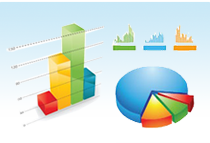Using the Get2Green data in your classroom
Get2Green data is available both online and in downloadable excel files. The data available is designed to be used by school based Eco Teams working on Eco-School pathways. This data allows teams to assess baseline data, design an action plan to improve their school’s performance in a certain sustainability area (energy conservation, water conservation, recycling, etc.), implement their action plan, and measure what impact the implementation of that action plan has on the data. This model can also be the basis for PBL (Project Based Learning) activities and service learning.
The charts below summarize the grade level possibilities for using FCPS Get2Green data to meet the Program of Studies. As is evident:
-
There are many opportunities to use this data to meet interdisciplinary standards
-
There are opportunities to work across multiple grade levels to meet standards for the grade levels involved
-
The data can be used purely as numbers to analyze and manipulate or can be used as a basis for starting a school-wide conservation initiative
Submit your ideas for using the data to the Get2Green Team - [email protected]
Ideas by Grade
| Topic |
Topic Ideas |
| Math |
-
Round whole numbers
-
Compare numbers between 0 and 9,999
-
Represent whole numbers on an open number line
-
Determine whether an estimate or an exact number answer is appropriate
-
Estimate sums, differences, and products
-
Add or subtract two whole numbers each 9,999 or less
-
Collect data using surveys, polls, questionnaires, scientific experiments, and observations
-
Construct, read, analyze, and interpret line plots, picture graphs, bar graphs, charts and tables
|
| Science |
-
Energy conservation
-
Effects of human influence-quality of water, air, habitat
-
Investigate: make predictions, formulate hypotheses, gather data, make inferences, draw conclusions
-
Data: Chart, graph, analyze, communicate
|
| Reading |
|
| Oral and Writing Communication |
-
Participate in group discussions
-
Present oral reports: Plan with audience in mind, organize and sequence information, include relevant details, etc.
-
Write: directions, friendly letters, simple explanations, short reports, stories
-
Use Technology to plan, draft, revise, edit and publish
|
| Social Studies |
-
Community Service
-
Natural, human, and capital resources
-
Producers, goods, and services
-
Economic choice and opportunity cost
-
Relationship between environment and culture
-
Volunteering
-
Compare and Contrast
-
Explain cause and effect
-
Collect, organize, and interpret information
-
Participate in groups
-
Make decisions
-
Draw conclusions and generalizations about data
-
Make and use charts, bar graphs, and pie graphs
-
Read and construct maps, tables, graphs, and charts
|
| Topic |
Topic Ideas |
| Math |
-
Compare and order decimals, fractions, percents, and numbers written in scientific notation.
-
Solve Problems with Rational Numbers/Percents/Ratios/Proportions
-
Determine the Percent of Increase or Decrease for a Given Situation
-
Collect, Organize, and Display Data
-
Make connections between any two representations (tables, graphs, words, and rules) of a given relationship.
|
| Science |
-
Construct/Interpret Data Tables: IV, DV, Derived Quantities, # Trials
-
Construct/Interpret Data Tables: Descriptive Statistics, Range, etc.
-
Make Valid Conclusions After Analyzing Data
-
Use Research Methods to Investigate Practical Problems and Questions
-
Extend the Energy/Electricity Unit to investigate human uses of energy and energy conservation
|
| Social Studies |
-
Create & Explain Maps, Diagrams, Tables, Charts, Graphs, Spreadsheets
-
Identify a Problem and Recommend Solutions
-
Create an Informed, Carefully Reasoned Position on a Community Issue
-
Select and Defend Positions in Writing, Discussion, and Debate
-
Exercise good citizenship by practicing thoughtful decision making
-
Describe How Individuals and Interest Groups Influence Public Policy
|
| Language Arts |
-
Use interviewing techniques to gain information (Interview your energy specialist about this data)
-
Develop and deliver oral presentations
-
Analyze, develop and produce media messages
-
Read, comprehend, analyze variety of nonfiction texts
-
Write in a variety of forms
-
Apply knowledge of appropriate reference materials to produce product
|
| Topic |
Topic Ideas |
| Active Physics |
|
| IB Environment and Society |
-
Discuss factors that affect the choice of energy sources by societies
-
Water resources
-
Environmental demands of human populations
-
Environmental Value Systems
|
| Engineering |
|
| Biology |
|
After School
Eco Club |
|


